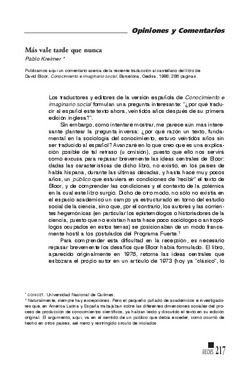Más vale tarde que nunca
Fecha
1999-11Autor
Kreimer, PabloResumen
Los traductores y editores de la versión española de Conocimiento e imaginario social formulan una pregunta interesante: “¿por qué traducir al español este texto ahora, veintidós años después de su primera edición inglesa?”.
Sin embargo, como intentaré mostrar, me parece aún más interesante plantear la pregunta inversa: ¿por qué razón un texto, fundamental en la sociología del conocimiento, estuvo veintidós años sin ser traducido al español? Avanzaré en lo que creo que es una explicación posible de tal retraso (u omisión), puesto que ello nos servirá como excusa para repasar brevemente las ideas centrales de Bloor: dadas las características de dicho libro, no existió, en los países de habla hispana, durante las últimas décadas, y hasta hace muy pocos años, un público que estuviera en condiciones de “recibir” el texto de Bloor, y de comprender las condiciones y el contexto de la polémica en la cual este libro surgió. Dicho de otro modo, no sólo no existía en el espacio académico un campo ya estructurado en torno del estudio social de la ciencia, sino que, por el contrario, los autores y las corrientes hegemónicas (en particular los epistemólogos o historiadores de la ciencia, puesto que no existían hasta hace poco sociólogos o antropólogos ocupados en estos temas) se posicionaban de un modo francamente hostil a los postulados del Programa Fuerte. The translators and editors of the Spanish version of Knowledge and Social Imaginary ask an interesting question: “why translate this text into Spanish now, twenty-two years after its first English edition?”
However, as I will try to show, I find it even more interesting to pose the opposite question: why was a text, fundamental in the sociology of knowledge, untranslated into Spanish for twenty-two years? I will advance what I believe is a possible explanation for such a delay (or omission), since this will serve as an excuse to briefly review Bloor's central ideas: given the characteristics of said book, it did not exist in Spanish-speaking countries. , during the last decades, and until very few years ago, an audience that was in a position to “receive” Bloor's text, and to understand the conditions and context of the controversy in which this book emerged. In other words, not only did there not exist in the academic space a field already structured around the social study of science, but, on the contrary, the authors and hegemonic currents (particularly epistemologists or historians of science, (since until recently there were no sociologists or anthropologists working on these issues) they positioned themselves in a way that was frankly hostile to the postulates of the Strong Program.

